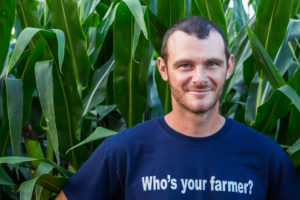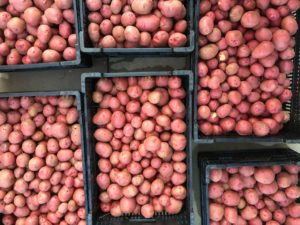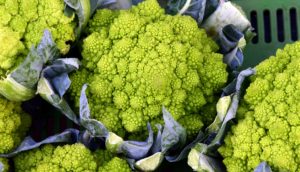How to Tell if CSA Would Be Right for You

CSA members often cite wanting to get to know a real farmer as part of their motivation for joining a CSA.
CSA stands for “Community Supported Agriculture,” and is just one of the many ways customers who believe in “real, transparent food” can support a farmer.
But it’s not the only way.
What’s the difference between supporting a farmer through a CSA versus a roadside stand? Or a farmer’s market?
Why would a person consider signing up for a CSA instead?
These are great questions. And everyone who considers joining a CSA should be asking them.
The reality is that CSA is not a good fit for everyone, and you shouldn’t feel bad if it’s not a match for you.
The CSA customers who come back year after year are a “certain kind” of customer. Not a “better customer” — just a certain kind — the kind that matches the unique format of a CSA model.
Is CSA the Right Fit for You?
Download our Guide "6 Questions You Should Ask Before You Join a CSA" to help you figure out if you're a good fit for our veggie box membership.
It’s best to go into the decision with your eyes wide open, and see if your expectations match the experience that a CSA will give you.
The reality is that CSA is not a fit for everyone, and you shouldn’t feel bad if it’s not a match for you.
So how do you decide if our CSA would be right for you?
Before you sign up for this seasonal commitment to a specific farmer, ask yourself these 6 questions….
Q1: Is the relationship to the actual farmer important to you? (Do you want to support a farmer?)
Effective CSAs focus on the farmer-customer relationship as much as the product.
In fact, in our surveys of current members, we find again and again that the number one reason for joining a CSA was to support a local farmer.
CSA members want to be able shake the hand that feeds them.

Farmer Kurt grows his vegetables specifically for his CSA members. 90% of our revenue comes from our CSA investors.
There’s something rewarding about knowing you are doing your part to support a local farmer.
Call it satisfying your “food conscience.”
CSA is a mechanism you can put into your weekly routine that allows you to access great-tasting food, knowing there’s a real farm family’s livelihood depending on it.
This means that you are committed to staying with a specific farmer through an entire season, come thick or thin.
Inherent in this arrangement is the understanding that there is a risk. Mother Nature may send too much sun or rain, bugs or disease, and a certain crop or crops may not appear in your share that summer.
On the flip side, there may be a bumper crop of tomatoes or cucumbers, and you’ll be swimming in cucurbits.
CSA members live with and embrace this reality every day.
Their motivation for supporting the farm is just as much about having the back of the farmer as it is about getting the full financial value of their share.
Make sure you read that last sentence again… it’s kinda huge.
But this relationship goes both ways.
When you join a CSA, your farmer will make an attempt to cultivate a connection with you too. This means
- They learn your names and work hard to make the “big CSA” feel like a small family.
- They might plan events to get you engaging with the farm.
- They try to add value to your life, by teaching you about their food’s story, or how to prepare it.
- They do things to help you succeed at eating their food.
This doesn’t mean you have to take advantage of these connecting points. But when you do, your CSA experience becomes more rich for both you and the farmer.
This relationship experience is part of what you are paying for in a CSA arrangement.
Q2: Do you value having quality vegetable ingredients that actually taste good?

Our vegetables become your medium to create in the kitchen. Make something beautiful.
Cardboard tomatoes in the winter.
Blah. If you’re a CSA prospect, you know this frustration well.
Taste matters for foodies. Because you know that putting together a terrific meal in your kitchen isn’t just about your skill.
It starts with the ingredients.
The second most important quality of our CSA “masters” (people who “stick” with CSA) is that they love food. Real food.
Food that tastes like it should, because it’s grown in quality soil.
In fact, CSAs often create food snobs, because customers finally experience how a carrot should really taste, and they cannot go back to the watered down version called “baby carrots” at Kroger.
If you really love cooking and you really value taste, then you will LOVE being in a CSA. Because CSAs are all about providing high-quality, artisanal vegetables that make your home dining experience feel like an event.
You’re paying for that taste experience when you join a CSA.
If you’re just looking for a basic celery and carrot at the cheapest price so you can make an iceberg salad — this is not your gig.
Q3: Are you willing to try new foods? (Really?)

Red potatoes. A classic in everyone’s pantry. We provide cozy comforts AND unusual outliers in every CSA box to push your horizons in the kitchen.
CSAs will push you to try new foods and explore variety in your kitchen.
Read between the lines here: You will discover new veggies you love, and you’ll discover new veggies you hate.
Part of the CSA experience means getting exposed to a wide variety of vegetable cultivars. We put veggies in your box that you may have never seen before, and we teach you how to eat them.
Look let’s face it:
We know that if left to your own devices, you would never purposely put a kohlrabi in your box.
(Or would you? If you would then you would definitely click with CSA).
It’s all part of the great goal in CSA of developing food diversity and teaching our communities (and our kids) how to eat seasonally again. If you want to grow in the kitchen, you have to push yourself to try new ingredients.
Here is an actual quote taken from our end-of-year surveys by a CSA member:
CSA has introduced my family to veggies that I never would have bought at the store, and I learned that we liked them! Also it helped me become more creative in my cooking.
I couldn’t have said it better myself.
Q4: Do you need control in your menu planning?

Green romanesco — a variety of cauliflower. Would you be willing to play around with new ingredients like this?
Remember the saying: “You get what you get and you don’t throw a fit?”
CSA members have to learn to be flexible with their menu and make things work in the kitchen, because you often don’t know what you will get in your box until a few days before the pick up.
Some people love this spontaneity. Others will be stressed by it.
Think hard on this:
Are you willing to give up some control over what goes in your box? Or do you need to live by your plan?
If you’re someone that wants tohave spinach lasagna on Wednesday, and your box doesn’t have spinach that week, will you be upset that you have to go elsewhere to supplement your CSA box contents?
If so, then you may be better off buying from the grocery store or farmer’s market retail stands.
This is the number 1 reason non-renewing members give us for leaving our CSA:
“I didn’t get enough of the things I wanted, and I got too much of the things I didn’t.”
CSA works best for customers who see their kitchen as a creative space, and our vegetables as the “paint” for their canvas.
They can handle the spontaneity required and are willing to experiment with new ingredients to make old meal templates come alive in new ways.
Q5: Are you willing to work at eating the CSA way? Patience, my apprentice. (It’s a marathon, not a sprint to the finish line).
CSA takes time to see results. We have customers that have been with us for over 5 years, and they all say it took about 2-3 years before they learned how to consistently use the box’s full contents.
That means you will waste some food on the front end, as you go through your learning curve.
Come into this experience with an adventurous spirit, and go easy on yourself if you fail to eat the entire box every week at first. It’s really hard to do, especially as a rookie to the system.
There will be many weeks when you have best intentions to be a super-chef and maximize your CSA tasting experience… and then real life sets in, and you find yourself simply eating the broccoli raw with ranch dip.
It can sometimes feel like you’re “failing” in your original goal to change the way you eat.
Realize that if this is your goal, it takes time to learn the skill sets. (Don’t worry, we’ll teach them to you). Set realistic goals the first year, and work your way into it.
Also realize that in this journey to kitchen mastery, you’re going to waste some food, especially in the first learning year.
This is a really hard reality for some to face.
Either you don’t get home to make dinner in time because your life is hectic (so the veggies rot)…
…or you end up eating take-out several times a week because you’re playing chauffeur to your 3 kids (so the veggies rot).
Like all paradigm shifts, it takes time to develop new habits and learn how to eat nimbly.
If you are committed to learning how, you can do it!
But it may take a few seasons before you feel like you’ve got it down.
Do you have the staying power to “work” at CSA?
Q6: Are you looking for a “deal”? Are you comparing CSA prices to the grocery store?
People who fully embrace the CSA model don’t look for their membership to be a “deal” or a bargain.
And they don’t compare the CSA experience to the grocery store price table.
Read that again. This is a really key point.
It is absolutely understandable to ask, “How much does it cost?” And to then weigh the pros and cons.
Supporting a CSA financially however is not just about doing a cost analysis of each vegetable you receive in your box and comparing it to what you’d pay at Kroger or Costco.
Our vegetables have added value because every one of our vegetables is telling a story.
Not just the story of how the food was raised, how it was harvested, or what struggles it faced to come to your plate.
Not just the story of the farmer and how you help them live out their calling to the land.
Every vegetable is also telling YOUR unfolding story.
Our vegetables become a means to an end: they showcase your journey with food.
They are the starring attraction in your quest to master your kitchen space and prepare a delicious meal to rival any restaurant fare — a meal you can be proud of.
This is not something any grocery store can give you.
CSA customers appreciate this added value of our product, and are willing to pay a premium for it.
So if you’re saying to yourself, “Well that’s more than we’d pay at _____” ~ you may want to hit the pause button.
Just sayin’…
QUESTION #7: Will you be traveling a lot this summer?
How’d you do?
Did you pass the quiz?
Remember, CSA is just one model out there for getting fresh farmer food onto your table. For those who value the story, the journey, and the farmer relationship behind the food, it can be a great option that can change the way you eat forever.
But there’s no shame in passing on CSA and instead buying weekly “a la carte” from our online store.
And that may in fact be a better fit to your style or needs.
We do both, so we just want you to be in the right fit.
As in all things, expectations determine how you experience the product. To set you up for CSA success, make sure your expectations align with the philosophy of CSA before you commit.
